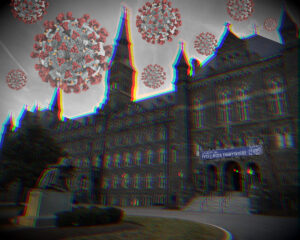With Georgetown’s announcement that it was only bringing back 1,000 students for the spring semester, many students made the decision to modify their housing plans for the semester to attempt to replicate the college experience off campus.
Now, students living in the DMV must balance being near the Hilltop and preventing a rise of student cases within the city.
Even as Zoom fatigue and personal issues continue to impact students remaining at home for the semester, some students have decided to move to Washington D.C., purchasing leases with roommates around the metro D.C. region. The change in student plans follows a wave of student and parent disappointment with Georgetown’s closure, including a petition to reopen campus that gained 1,800 signatures as of Feb. 23.
Some Georgetown students have adopted a less traditional method of student housing: hotels. In conjunction with students from American and Howard Universities, students have been flocking to hotels as a localized housing option for the semester. “It ended up being more flexible than a short term lease and also about the same price as a short term lease,” Gershon Stein (SFS ‘24) said. “It ends up being cheaper than the dorms.”
“I felt like it was very hard to stay focused at home, with all the little distractions,” Stein said.
An earlier Office of Analysis and Decision Support and the Center for New Designs for Learning and Scholarship poll reflected similar sentiments among the student body, with only 30-40% of students reporting being “very engaged” in their classwork.
For other students, adjusting to the online spring semester has meant adjusting to a new location or a new time zone relative to the East Coast, where the pressures of an online environment can be exacerbated. Anna Zaman (SFS ‘24), who began living in Pakistan with her grandparents in November, noted that while some professors have been accommodating, there are struggles to stay connected even as Georgetown enters its third online semester.
“Most of my classes are right before midnight or right after. I can’t do any clubs, since the meetings are at 6 or 7 a.m. my time, and it’s hard to do clubs without going to meetings,” Zaman said in an interview with the Voice.
Even if tests have flexible hours for students in other time zones, assignments are frequently due at 11:59 p.m EST and participation is often mandatory, which can put significant pressure on students like Zaman. “My schedule is completely insane,” she said.
The surge of students relocating to the DMV over the last two semesters has not been without consequences, however. Although Washington D.C. has begun the vaccination process for people in high-risk categories for COVID-19, the influx of students has augmented infection rates. The increase has some worried that D.C. Intensive Care Units and hospitals will not be able to keep up with infections, as the city’s daily case rate continues to grow, with cases rising nearly 16 percent even as hospitalizations have dropped 15 percent over a 14-day change as of March 4.
Georgetown’s weekly percentage of positive tests, out of students living on campus and in the Burleith, Foxhall and Georgetown neighborhoods, as well as faculty, decreased slightly from 0.87 percent Feb. 14-20 to 0.86 percent Feb. 21-27. The first week of the semester, the percentage of positive tests nearly doubled.
In response to increased infection rates around campus, the Provost’s Office announced on March 3 that all hybrid undergraduate courses, academic meetings, or gatherings are paused until at least April 12. While hybrid classes for undergraduates living on campus were originally moved online until March 8, the extension comes over concerns students, faculty, and staff may travel during the week of spring break.
Georgetown’s campus has been more lively than in the last several months with the increase in students, according to Rose Dallimore (SFS ‘22), who has been living on campus in both the fall and spring semesters. “There’s a little more of a sense of community, just because there are more people walking around and they’re opening new study spaces for campus.”
Students on campus, however, also have concerns over rising cases, especially among students living in the Georgetown, Foxhall, and Burleith neighborhoods and surrounding DMV. “It’s been particularly concerning and difficult for those who have been here and following these restrictions and understanding that we can’t put each others’ housing security or health at risk on campus, but a lot of students off campus don’t get that, or get the threat,” Dallimore said.
The next increase in the on-campus student population is not expected until the summer, when Georgetown plans to bring members of the class of 2024 to campus to experience life at the Hilltop before new student orientation for the incoming class of 2025. The program will offer students the opportunity to take between 6-8 credits of freshmen and sophomore classes in conjunction with trips and experiences designed to help students bond.
One of the students considering the Summer Hilltop Immersion program for first year students, Zaman is looking forward to the opportunity for a more normal Georgetown experience during the five week summer program. “I like the fact we’ll be on campus before we’re sophomores,” Zaman said.





